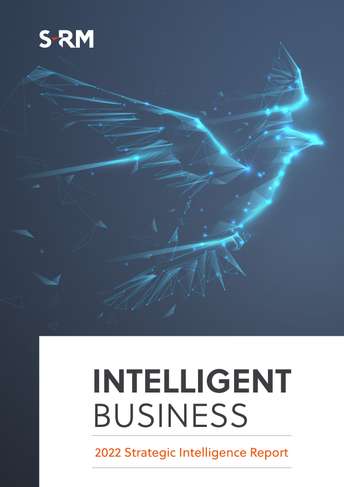Cheryl Steele, CSO, Starbucks Coffee Company, gave S-RM an in-depth interview for our recent paper, Intelligent Business: 2022 Strategic Intelligence Report. In the resulting article shared here, Cheryl reflects on navigating the ‘forest of information’, the role of strategic intelligence as an enabler and accelerator of organisational goals, and provides advice for those starting up an in-house intelligence function.
Open Source Versus Strategic Intelligence
The contrast in strategic intelligence versus open source is stark. There are endless amounts of open-source information out there. You can find whatever you want. But, if you're walking through a forest of information without a path, you can become overwhelmed and simply want to back out. Strategic intelligence is about walking into that forest with intent and good navigation.
For organisations, think of it in three stages. The challenge at the front end is, ‘are we being thoughtful about what we're looking for?’ Second, ‘how are we navigating while we're in the thick of the data?’ And finally, ‘how are we calibrating what we've collected, condensing it and moving it forward in a format that's useful, digestible and action-oriented at the back end?’
Intersections of Risk
In the private sector intelligence is often used in a risk specific way i.e., the risk owner is thinking about intelligence to inform one specific swim lane. They may not have an overarching view of where things overlap, intersect and integrate.
One of my key accountabilities is business continuity. By its very nature, business continuity is the inheritor of every other risk because business disruption can be driven by a host of different things. Leading business continuity I see that no single risk is going to happen in isolation. The easiest example that we've seen across the world in the past couple of years with COVID has been the continuity of supply chains. Can I physically get product A to location X? But then you must examine everything that networks off that seemingly simple question. How might that impact my ability to do business at the end location? How might finding disparate sources and inputs into the supply chain impact due diligence processes?
"THINKING ABOUT RISK IN ISOLATION MEANS YOU MAY MISS THE INTERSECTIONS AND THE KNOCK-ON IMPACTS."
Thinking about risk in isolation means you may miss the intersections and the knock-on impacts. Strategic intelligence comes in here; it is ‘the business of the business’. What might materialise over the next six, nine or 12 months? How do those risks look in a three dimensional, textured, way? Layering in the different dimensions and topic areas of intelligence allows you to get an integrated picture. This rounded view of the risk and risk horizon can then drive contingency planning and preparedness.
Outsource or In-House?
Many companies go through a pendulum swing between building and retaining in-house talent to outsourcing it. This is as true of technology as it is of intelligence, or really any other shared service. If we think of a company as a car, the in-house intelligence function is the engine.
As insiders we understand the points of leverage and the relationships between risk owners. We have the knowledge around which questions and insights are the most compelling. Within the in-house team you may have pockets of deep subject matter expertise or you may have a team of generalists. Either way, you will have an internal structure to ladder off of. Only when that internal function is set up do you ask, ‘where do we supplement and complement with outsourced expertise’? If it is a bespoke or timebound issue it wouldn't make sense to make an investment in a full-time in-house person.
When you recognise a need for external support, you then look at how you’ll build that external network– the vendors, partners and consultancies. Over time they will start evolving with you, understanding more about the business and industry you’re in. Eventually these outsourced resources become partners who can push ideas in from the outside, adding value in a dynamic way.
"IN THESE PAST COUPLE OF YEARS, ACROSS THE BOARD, THERE’S BEEN AN INCREASE IN THE URGENCY, IMMEDIACY AND INTERSECTIONALITY OF RISK AND DISRUPTION. THAT’S PUT A NEW LEVEL OF ENERGY AND ATTENTION ON WHAT STRATEGIC INTELLIGENCE CAN CONTRIBUTE."
In these past couple of years, across the board, there’s been an increase in the urgency, immediacy and intersectionality of risk and disruption. That’s put a new level of energy and attention on what strategic intelligence can contribute. We're always going to have that pressure of balancing the longer term (meaning beyond the fiscal year), against the urgency of today. There's a recognition of the increased value of having a strategic intelligence partner going through those three stages I referenced earlier – asking the right questions, thinking about the answers in a robust way, and assessing the information to bring actionable insights.
Intelligence as an Enabler
Demonstrating the value of intelligence back to the different leaders across the business is key to building credibility. While you could take a top-down approach, in my opinion that leads to a short-lived or passing understanding of the value of intelligence. Bringing the whole community of stakeholders along with you is much stickier. Then they can see for themselves how the function helps creative thinking, bringing together parts of the business that traditionally have not had relationships.
When you achieve wide understanding that intelligence is a business driver, not an obstacle throwing up red flags left, right and centre, then you are seen as both an enabler and an accelerator of what the entire enterprise wants to accomplish.
Taking the First Steps
If you are in the very early stages of trying to start up an intelligence function within your enterprise, the first piece of advice I give is – do you trust that you truly understand the business of the business? Do not get fixated on ‘does the COO or CEO see value in intelligence’. Instead, work to understand who the most critical figures and influencers in the business are, the P&L owners, the critical function leads. Start there to build the credibility of the service you provide. Show the explicit value that you can drive into them. Once you’ve done that, you will find it easier to unlock future investment for your capability.





 Email Martin
Email Martin






 @SRMInform
@SRMInform
 S-RM
S-RM
 hello@s-rminform.com
hello@s-rminform.com

